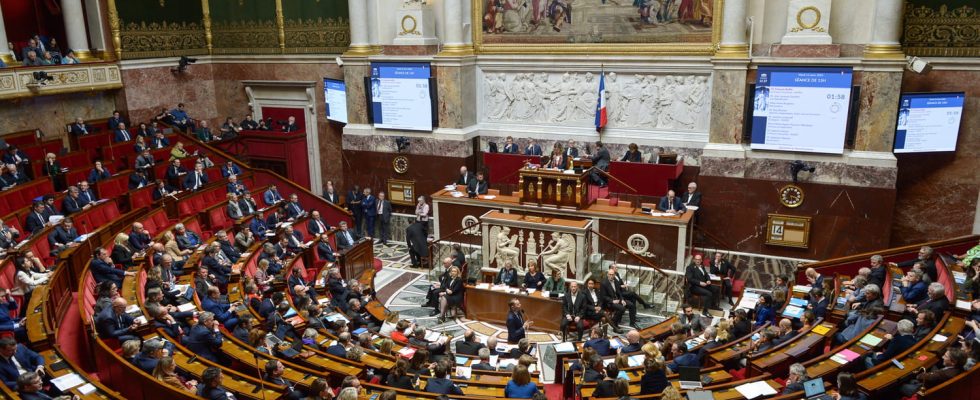SECTION 49.3. The government has decided to use 49.3 to adopt the pension reform in the National Assembly, this Thursday, March 16, 2023. The decision is criticized but is it irreversible?
[Mis à jour le 16 mars 2023 à 16h45] The use of 49.3 on the pension reform is not a surprise but arouses the ire of the opposition. Many elected officials consider this use of the parliamentary tool as a failure for the government and Emmanuel Macron, but also as “worrying institutional violence” and a “brain of honor” to democracy according to some trade unionists. However, both the Head of State and the Head of Government say they are making this choice, which does not go their way politically but which was necessary in the face of “the financial, economic risks [qui] are too big”, according to the declarations of Emmanuel Macron in front of his ministers reported by BFM TV.
For the time being 49.3 imposes the adoption of the pension reform by sweeping the use of the vote of the deputies, for which a majority of favorable votes was not guaranteed. Still, when using 49.3, the deputies will oppose motions of censure and the hopes of the opposition crystallize around a cross-party motion tabled by the centrist group LIOT joined by other deputies. The text will be voted on Saturday or Monday, probably, and if it is adopted by an absolute majority, the pension reform will be rejected and the government overthrown. But nothing is less certain. The holding of this vote on the motion or motions of censure, however, has among Elisabeth Borne to recall during her speech, with a touch of irony: “A vote will therefore take place, as it should. And so it is parliamentary democracy which will have the last word”.
The majority rather for or against the use of 49.3?
Until the morning of March 16, most elected representatives of the majority defended a vote in the National Assembly. A wiser voice to legitimize pension reform but risky given the uncertainty surrounding the majority. Meanwhile, the presidential camp has taken the measure of the risks of not obtaining the majority of the votes of the deputies and did not want to rely on fate for the adoption of the pension reform.
Several elected representatives of the majority, ministers and even Prime Minister Elisabeth Borne preferred to draw article 49.3 to ensure the adoption of the text, despite the consequences that this implies, in particular a possible overthrow of the government. The tenant of Matignon also said to assume the fact of being “a fuse” in the event of recourse to 49.3, a necessary evil must think Macronie.
However, other deputies of the majority have called for the text to be voted on in the National Assembly, in particular the Renaissance deputy Constance Le Grip or the MoDem Philippe Vigier. The latter defended this Thursday morning on France Inter : “The reform must pass […] and I would like us to be able to vote this afternoon. You have to take the risk. When Nicolas Sarkozy made the constitutional reform, he won with one voice. Political life is also about taking risks”. But this position seemed more often motivated by the fear of seeing the government disavowed. of the Charles de Courson center signed by elected LR casts doubt on the future of the government.
Update on 49.3
What is article 49-3 of the Constitution?
Paragraph 3 of Article 49 of the Constitution, commonly referred to as 49.3, appears in Title V of the Constitution. This legal device is used to regulate the “relationships between the government and the Parliament”. The Prime Minister is the person who can make use of it after deliberation by the Council of Ministers. It is then possible to suspend the examination of a particularly controversial bill within the National Assembly, and therefore of all the negotiations that accompany it. This would allow the presidential camp to force through a text, therefore without a vote, despite opposition, and to speed up the legislative procedure, in particular by putting an end to any obstruction by parliamentarians.
The use of 49.3, however, has a price and each time the article is used, the government “engages its responsibility”. In other words he takes the risk of having to resign if a motion of censure tabled by the opposition, within 24 hours, is voted. The law provides that in the event of a rejection of this motion of censure, “the bill or proposal is considered adopted.” On the other hand, if it is adopted, “the text is rejected and the Government is overthrown.” However, if no motion of censure is tabled within 24 hours, “the bill or proposal is considered adopted.”
What is a motion of censure?
The motion of censure is a major parliamentary tool. Its objective: to lead, if it is adopted, to the resignation of the Prime Minister as well as of his government. In the context of the use of Article 49.3 of the Constitution, it can be tabled by deputies. They must be at least 58, or one tenth of the National Assembly. To be adopted, it must collect 289 votes “for”, ie the absolute majority of the hemicycle, in this case 2587 votes since two seats are vacant. In the event of a relative majority (a majority of “for” but less than 289), it is not adopted. Today, in the National Assembly, the government of Emmanuel Macron has less than 289 deputies (249). Enough to raise fears of a possible overthrow of the government if all the oppositions sign the same motion of censure.
